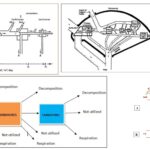IB Biology 40 Views 1 Answers
Sourav PanLv 9November 8, 2024
What causes emphysema, and what are the long-term effects on the lungs and breathing?
What causes emphysema, and what are the long-term effects on the lungs and breathing?
Please login to save the post
Please login to submit an answer.
Sourav PanLv 9May 15, 2025
Emphysema is a progressive lung disease primarily characterized by damage to the alveoli, the small air sacs in the lungs responsible for gas exchange. Understanding the causes and long-term effects of emphysema is crucial for managing this condition effectively.
Causes of Emphysema
- Cigarette Smoking:
- Smoking is the leading cause of emphysema, accounting for approximately 80-90% of cases. The harmful chemicals in tobacco smoke damage lung tissue, leading to inflammation and destruction of alveolar walls over time .
- Environmental and Occupational Exposures:
- Long-term exposure to air pollutants, such as chemical fumes, dust, and vapors from industrial sources, can contribute to the development of emphysema. This includes exposure to biomass fuels and secondhand smoke .
- Genetic Factors:
- A rare genetic condition known as alpha-1 antitrypsin deficiency (AAT deficiency) can lead to early-onset emphysema. This genetic disorder affects the production of a protein that protects lung tissue, making individuals more susceptible to lung damage.
- Other Factors:
- Additional risk factors include chronic respiratory infections, allergies, and low birth weight, which can predispose individuals to develop chronic obstructive pulmonary disease (COPD), of which emphysema is a part .
Long-Term Effects on the Lungs and Breathing
- Destruction of Alveoli:
- Emphysema leads to the destruction of alveolar walls, resulting in fewer but larger air sacs. This reduces the surface area available for gas exchange, impairing oxygen uptake and carbon dioxide removal from the bloodstream .
- Air Trapping and Hyperinflation:
- The damaged alveoli can cause air trapping, where stale air becomes trapped in the lungs during exhalation. This results in hyperinflation of the lungs, making it difficult for individuals to take in fresh air . As a consequence, patients often experience increased shortness of breath (dyspnea), especially during physical exertion.
- Decreased Lung Function:
- Lung function gradually declines as emphysema progresses. Patients may experience a reduced forced expiratory volume (FEV1), indicating compromised airflow during exhalation. This decline in lung function can significantly impact daily activities and overall quality of life .
- Increased Risk of Respiratory Infections:
- Individuals with emphysema are at a higher risk for respiratory infections such as pneumonia and bronchitis due to compromised lung function and impaired mucociliary clearance .
- Cardiovascular Strain:
- The heart may be strained due to reduced oxygen levels in the blood, leading to complications such as pulmonary hypertension and heart failure over time .
- Chronic Symptoms:
- Symptoms such as chronic cough, wheezing, and fatigue may worsen over time, leading to limitations in physical activity and an overall decline in health status
0
0 likes
- Share on Facebook
- Share on Twitter
- Share on LinkedIn
0 found this helpful out of 0 votes
Helpful: 0%
Helpful: 0%
Was this page helpful?




